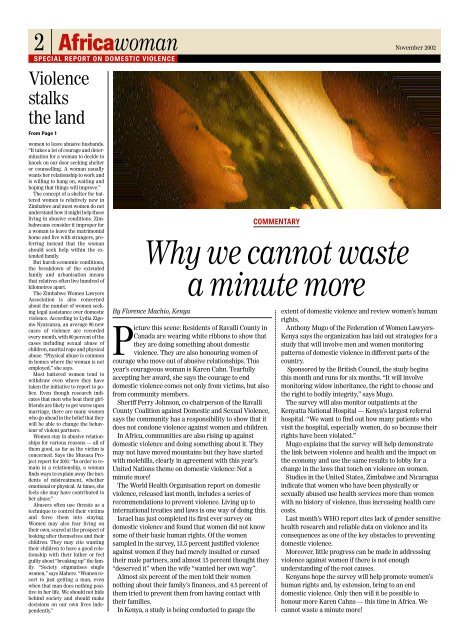Issue 7 - Domestic Violence - ColdType
Issue 7 - Domestic Violence - ColdType
Issue 7 - Domestic Violence - ColdType
You also want an ePaper? Increase the reach of your titles
YUMPU automatically turns print PDFs into web optimized ePapers that Google loves.
2 Africawoman November<br />
SPECIAL REPORT ON DOMESTIC VIOLENCE<br />
<strong>Violence</strong><br />
stalks<br />
the land<br />
From Page 1<br />
women to leave abusive husbands.<br />
“It takes a lot of courage and determination<br />
for a woman to decide to<br />
knock on our door seeking shelter<br />
or counselling. A woman usually<br />
wants her relationship to work and<br />
is willing to hang on, waiting and<br />
hoping that things will improve.”<br />
The concept of a shelter for battered<br />
women is relatively new in<br />
Zimbabwe and most women do not<br />
understand how it might help those<br />
living in abusive conditions. Zimbabweans<br />
consider it improper for<br />
a woman to leave the matrimonial<br />
home and live with strangers, preferring<br />
instead that the woman<br />
should seek help within the extended<br />
family.<br />
But harsh economic conditions,<br />
the breakdown of the extended<br />
family and urbanisation means<br />
that relatives often live hundred of<br />
kilometres apart.<br />
The Zimbabwe Women Lawyers<br />
Association is also concerned<br />
about the number of women seeking<br />
legal assistance over domestic<br />
violence. According to Lydia Zigomo<br />
Nyatsanza, an average 90 new<br />
cases of violence are recorded<br />
every month, with 80 percent of the<br />
cases including sexual abuse of<br />
children, marital rape and physical<br />
abuse. “Physical abuse is common<br />
in homes where the woman is not<br />
employed,” she says.<br />
Most battered women tend to<br />
withdraw even where they have<br />
taken the initiative to report to police.<br />
Even though research indicates<br />
that men who beat their girlfriends<br />
are likely to get worse upon<br />
marriage, there are many women<br />
who go ahead in the belief that they<br />
will be able to change the behaviour<br />
of violent partners.<br />
Women stay in abusive relationships<br />
for various reasons — all of<br />
them good, as far as the victim is<br />
concerned. Says the Musasa Project<br />
report for 2001: “In order to remain<br />
in a relationship, a woman<br />
finds ways to explain away the incidents<br />
of mistreatment, whether<br />
emotional or physical. At times, she<br />
feels she may have contributed to<br />
her abuse.”<br />
Abusers often use threats as a<br />
technique to control their victims<br />
and force them into staying.<br />
Women may also fear living on<br />
their own, scared at the prospect of<br />
looking after themselves and their<br />
children. They may cite wanting<br />
their children to have a good relationship<br />
with their father or feel<br />
guilty about “breaking up” the family.<br />
“Society stigmatises single<br />
women,” says Mahere. “Women resort<br />
to just getting a man, even<br />
when that man does nothing positive<br />
in her life. We should not hide<br />
behind society and should make<br />
decisions on our own lives independently.”<br />
Why we cannot waste<br />
a minute more<br />
By Florence Machio, Kenya<br />
Picture this scene: Residents of Ravalli County in<br />
Canada are wearing white ribbons to show that<br />
they are doing something about domestic<br />
violence. They are also honouring women of<br />
courage who move out of abusive relationships. This<br />
year’s courageous woman is Karen Cahn. Tearfully<br />
accepting her award, she says the courage to end<br />
domestic violence comes not only from victims, but also<br />
from community members.<br />
Sheriff Perry Johnson, co-chairperson of the Ravalli<br />
County Coalition against <strong>Domestic</strong> and Sexual <strong>Violence</strong>,<br />
says the community has a responsibility to show that it<br />
does not condone violence against women and children.<br />
In Africa, communities are also rising up against<br />
domestic violence and doing something about it. They<br />
may not have moved mountains but they have started<br />
with molehills, clearly in agreement with this year’s<br />
United Nations theme on domestic violence: Not a<br />
minute more!<br />
The World Health Organisation report on domestic<br />
violence, released last month, includes a series of<br />
recommendations to prevent violence. Living up to<br />
international treaties and laws is one way of doing this.<br />
Israel has just completed its first ever survey on<br />
domestic violence and found that women did not know<br />
some of their basic human rights. Of the women<br />
sampled in the survey, 13.5 percent justified violence<br />
against women if they had merely insulted or cursed<br />
their male partners, and almost 15 percent thought they<br />
“deserved it” when the wife “wanted her own way”.<br />
Almost six percent of the men told their women<br />
nothing about their family’s finances, and 4.5 percent of<br />
them tried to prevent them from having contact with<br />
their families.<br />
In Kenya, a study is being conducted to gauge the<br />
COMMENTARY<br />
2002<br />
extent of domestic violence and review women’s human<br />
rights.<br />
Anthony Mugo of the Federation of Women Lawyers-<br />
Kenya says the organization has laid out strategies for a<br />
study that will involve men and women monitoring<br />
patterns of domestic violence in different parts of the<br />
country.<br />
Sponsored by the British Council, the study begins<br />
this month and runs for six months. “It will involve<br />
monitoring widow inheritance, the right to choose and<br />
the right to bodily integrity,” says Mugo.<br />
The survey will also monitor outpatients at the<br />
Kenyatta National Hospital — Kenya’s largest referral<br />
hospital. “We want to find out how many patients who<br />
visit the hospital, especially women, do so because their<br />
rights have been violated.”<br />
Mugo explains that the survey will help demonstrate<br />
the link between violence and health and the impact on<br />
the economy and use the same results to lobby for a<br />
change in the laws that touch on violence on women.<br />
Studies in the United States, Zimbabwe and Nicaragua<br />
indicate that women who have been physically or<br />
sexually abused use health services more than women<br />
with no history of violence, thus increasing health care<br />
costs.<br />
Last month’s WHO report cites lack of gender sensitive<br />
health research and reliable data on violence and its<br />
consequences as one of the key obstacles to preventing<br />
domestic violence.<br />
Moreover, little progress can be made in addressing<br />
violence against women if there is not enough<br />
understanding of the root causes.<br />
Kenyans hope the survey will help promote women’s<br />
human rights and, by extension, bring to an end<br />
domestic violence. Only then will it be possible to<br />
honour more Karen Cahns — this time in Africa. We<br />
cannot waste a minute more!
















